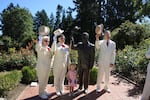
Portland Parks and Recreation
After the First World War threatened the future of European roses, Portland received notice that it had been selected for what would become the nation's oldest continuously operating public rose test garden in the country.
On Saturday, the city's famous International Rose Test Garden in Washington Park celebrated its centennial, a huge milestone for the City of Roses, which itself has seen many changes.

The International Rose Test Garden.
Portland Parks and Recreation
"You know 100 years old — much of you look younger than that," Portland Parks and Recreation Director Mike Abbaté told a crowd of people at the celebration's opening ceremony.
"It was a different Portland. But the Rose Garden has grown and become so integral to our culture as the Rose City.”
But even the Rose Garden has seen changes. A park replacement bond approved by Portland voters in 2014 financed a new accessible promenade through the garden.
Under its current curator, Harry Landers — who has worked with Portland Parks for almost three decades and is set to retire this year — the garden has seen an expansion of species of roses from 3,500 to 10,000.
The garden has also become a significant tourist destination in Portland, drawing around 700,000 visitors every year.

Royal Rosarians -- and one honorary Rosarian -- pose for a photo at the 100 year celebration of the International Rose Test Garden in Portland.
Ericka Cruz Guevarra / OPB
Pat Klum has been a volunteer "dead-header" at the garden for 12 years. Klum, who is now retired, was born and raised in Portland. Her family came to Oregon in the early 1900s. She says she's witnessed all the changes happening in Portland. The garden, for her, seems to be a constant.
"This is just the most fun place in Portland," Klum said. "We've met people from all over the world [here]."
At the opening ceremony, City Commissioner Chloe Eudaly said the celebration marks an important moment to reflect on the significance of the 100-year-old garden.
"My colleagues and I have been charged with shaping the future of our city, and we're often looking 10, 20, 50, 100 years into the future hoping that we get it right," Eudaly said.
"I think this an important moment to stop, pause and look back and appreciate this gift that's been created for us over the past 100 years," she said, "and take heart that we do sometimes do it right."